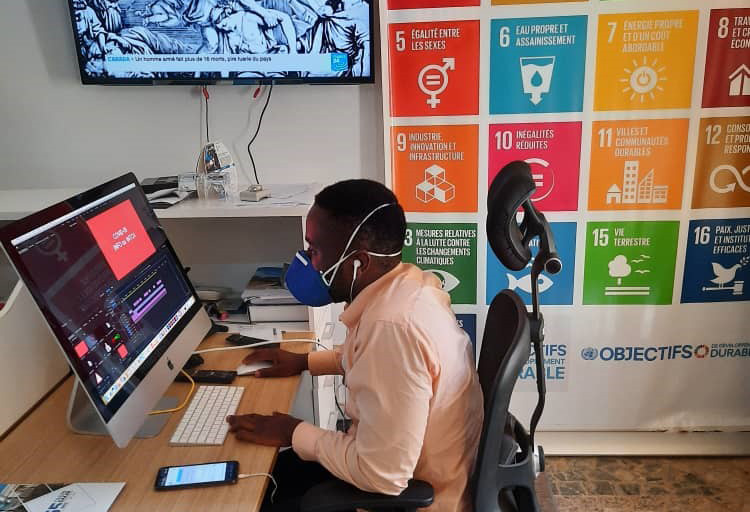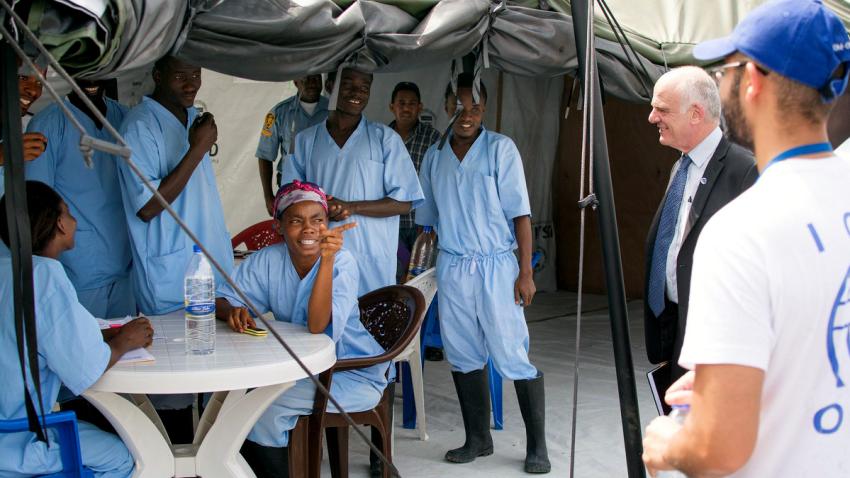“Taking the fight to COVID-19 is all about sharing the right information about what we can all do to help halt the spread of infection. But how do you do this in Senegal, where there are more than a dozen languages? In a bid to find a creative and reliable solution, the UN information team in Dakar has joined forces with musicians who have a loyal following in the country and the wider West African diaspora. In our latest report on how the UN is helping communities cope with the new coronavirus, we talk to Damian Cardona, Director of the UN Information Centre (UNIC) in Senegal.
"When I was on mission in Kinshasa, I liked to listen to Congolese music on the excellent Radio Okapi. It's wonderful because it mixes African and Latin rhythms. In Dakar I preferred to go to concerts to listen to it live," says Damian Cardona, a music lover and piano player, and since February 2015, Director of the United Nations Information Centre (UNIC) in Dakar, Senegal.
In this new COVID era, however, it is not so much a time for concerts as it is for preventative measures. In Dakar, the number of cases of infection is not high (on 12 May, the national total was 1,995 cases, of which 742 people recovered and 19 died) and a curfew puts the city to sleep from 8pm to 6am every day. Wearing masks has been compulsory since 17 April in all government departments, the private sector, shops and public transport, and all communal spaces are closed.

Screen capture from a public service video produced by UNIC Dakar.
Tackling the virus with information and music: a universal language
Since the beginning of the pandemic, UNIC Dakar has produced three public service videos, where the choice of music was an essential factor. The key is to use local sounds that people recognise immediately.
"The latest video deals with fake news, misleading information that creates even more fear than the disease itself, for example, that mosquitos transmit the virus,” Damian says. “In the film, you can hear chords played on a Kora, a beautiful guitar that is found all over West Africa. Our aim was to provide reliable information on a subject that people worry about, but at the same time transmit tranquillity and serenity."
In the other two videos, vital information is shared about the disease and how hand-washing and physical distancing can protect people. Making films isn’t always an easy process but imagine if you had to produce them in multiple languages, as Damian’s team does. "The texts of the three videos are in French, but we are in the process of dubbing them in a dozen languages such as Bambara, Wolof, Lingala and Kirundi. Here the elites speak French, but the people communicate in their own languages," he says.
The next challenge for the UN team will be to produce a video with Senegalese singer-songwriter Baaba Maal together with the World Health Organization and the Senegalese health authorities, to convince people to remain vigilant about avoiding infection.

Inside the UNIC Dakar office. United Nations photo: UNIC Dakar.
Dakar: a communications crossroads
With its roots in Senegal since 1964, the Dakar Information Centre has developed a truly staggering reach, among French and Portuguese-speaking African countries from Cape Verde to Madagascar, Côte d'Ivoire, Gambia, Guinea-Bissau, Mauritania and Senegal. It also has an important role in the Sahel region and beyond.
"We want messages about COVID-19 to reach the different diasporas of West Africa in countries like France, Spain, or Canada," says Damian.
Closer to home, Damian’s office also oversees assistance for international civil servants and their families. "We're talking about a collective of about 4,000 people who will be able to access a forum to share their experiences or request information," he explains.

A man rests on the side of the street. United Nations photo: UNIC Dakar.
Access to information ‘must be democratic’
Although Dakar does not have a significant number of cases of COVID-19 infection yet, the economic and social effects of the crisis are already hitting home: many people have lost their jobs and we are living through a great collective moment of uncertainty.
"What is terrible is that even if the nature of the disease is democratic and does not discriminate against anyone, those who were already the most vulnerable will be even more vulnerable with COVID-19,” Damian says. “We need to make sure that the access to information is also democratic.”
Are we going to build a better world after COVID-19? "I don't think we're going to become a 'Brave New World' in the Aldous Huxley way, but I'm sure we're going to fix a lot of things,” says Damian. “The impact has been so strong that it has taught us about strengthening public health, information, research and resilience.” If there is one single image that sums everything up for Damian, it’s this: a fit young Senegalese man running along the seafront. He’s outpaced all the other runners - and he’s wearing a mask. "The disease is there, but so is life,” Damian says.




